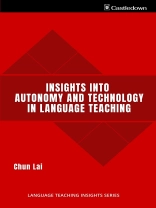Technology and autonomy share a common mission in language education, that is, to transform language education into learner-centered learning across boundaries. With this shared mission, technology and autonomy are closely intertwined, shaping the role of each other in language education. The two, if in harmony and mutually supportive, may work in synergy and reinforce each other in achieving the goal. Drawing on the literature and research findings from relevant research fields, including educational technology, educational psychology, adult and workplace learning and language education, this book gives an overview of the relationship of technology with learner and teacher autonomy. It discusses how technology both benefits and constrains autonomy, and how a positive interaction between the two could be fostered. It underscores a critical perspective in understanding their relationships and a holistic approach to boosting a positive reciprocal relationship between the two.
Table of contents
Introduction
PART I LEARNER AUTONOMY AND TECHNOLOGY
1 Learner Autonomy and Technology: An Introduction
2 Technology as a Facilitator of Learner Autonomy
3 Technology as a Constraint on Learner Autonomy
4 Factors that Influence Technology and Learner Autonomy
5 Facilitating the Interaction between Learner Autonomy and Technology
PART II TEACHER AUTONOMY AND TECHNOLOGY
6 Teacher Autonomy and Technology: An Introduction
7 The Impact of Technology on Teacher Autonomy
8 Fostering Teacher Autonomy with Technology – The What
9 Fostering Teacher Autonomy with Technology – The How
Conclusion: Critical and Holistic Perspectives
References
Index












